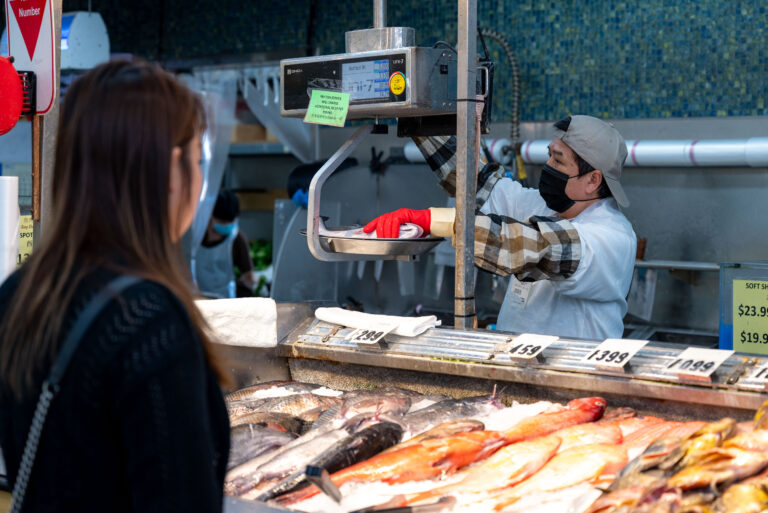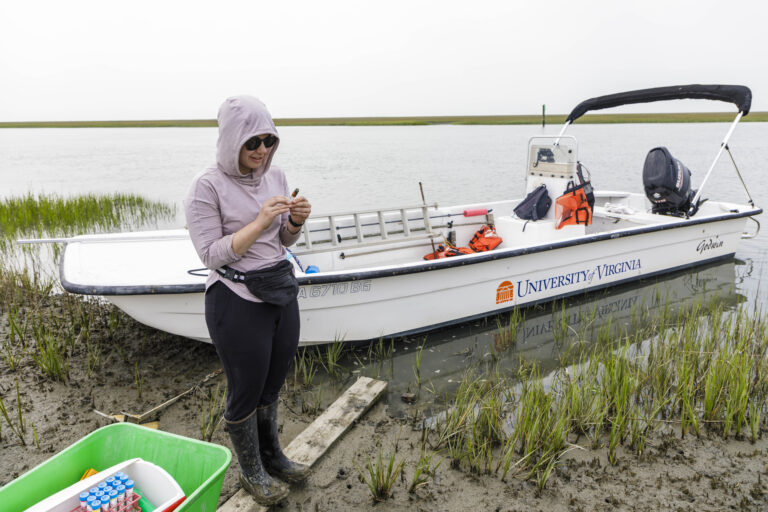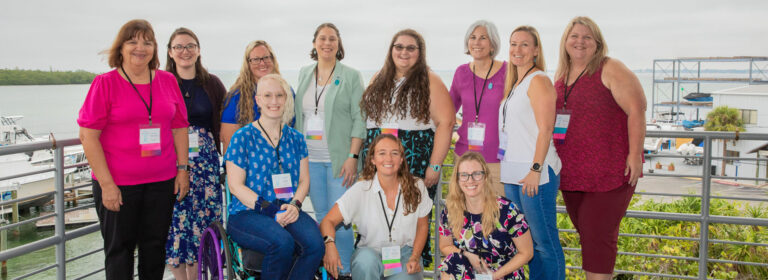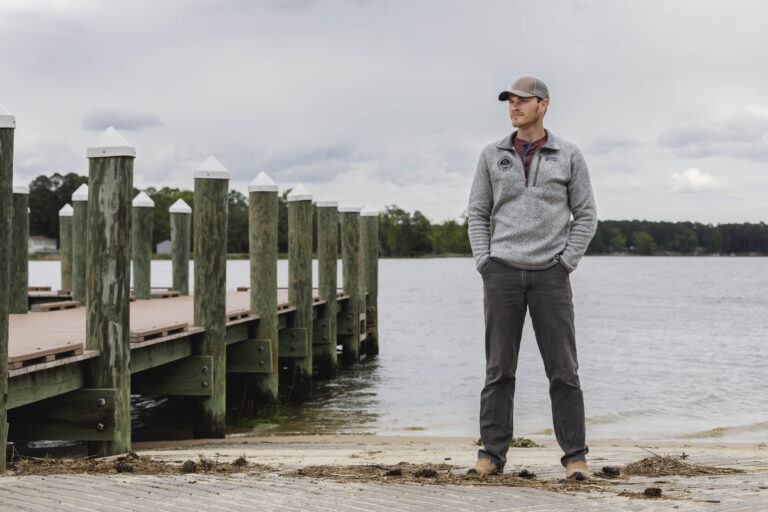Virginia Sea Grant Lead Research receives $1 million federal grant to tackle economic and marketing gaps in U.S. aquaculture industry
In a bid to strengthen the trajectory of the U.S. aquaculture industry, Virginia Sea Grant and a consortium of researchers led by Virginia Tech secured a federal grant of nearly $1 million to address critical economic and marketing gaps.
“The challenges faced by U.S. aquaculture, from regulatory complexity and stringency to rising input costs, create a complex economic reality for producers,” said Jonathan van Senten, the principal investigator of the project, a seafood economist at the Virginia Seafood Agricultural Research and Extension Center, and assistant professor in the Department of Agricultural and Applied Economics at Virginia Tech.
Awarded through a competitive funding opportunity offered by the National Oceanic and Atmospheric Administration (NOAA) Sea Grant, the funds will support the establishment of the Aquaculture Economics and Markets Collaborative over the next two years.
The collaborative draws expertise from institutions across the nation, including Virginia Tech, Mississippi State University, Texas A&M University, University of Hawaii at Hilo, University of Maryland, University of Alaska, Morgan State University, Maine Aquaculture Association, University of Guam, and University of Puerto Rico at Mayagüez, to address the multifaceted challenges facing the domestic aquaculture industry.
The United States, with its extensive coastline and abundant natural resources, holds immense potential for robust aquaculture production. However, despite a rising demand for seafood, the nation faces a daunting trade deficit, which surged to a record $20.3 billion in 2023, as reported by NOAA. This deficit underscores the significant reliance on imported seafood, totaling over 6 billion pounds.
Addressing these economic challenges within domestic aquaculture sectors is imperative to ensure sustainable growth, reduce dependency on imports, and strengthen domestic food security.
“Producers in U.S. aquaculture sectors are incredibly resilient and play a pivotal role in providing a wide variety of aquatic species to both food and recreational markets using diverse production systems,” van Senten said. “However, they also have to navigate a challenging economic landscape to establish and sustain successful businesses.”
“Establishing a network of training and Extension resources for economics and marketing will support informed decision-making to ensure long-term sustainability of domestic aquaculture sectors,” said Jonathan van Senten, a seafood economist and researcher with Virginia Tech and Virginia Sea Grant.
Project co-principal investigator Ganesh Kumar of Mississippi State University said the collaborative effort aims to empower the aquaculture industry through increased access to comprehensive economic and market research to understand dynamic markets and support the U.S. in becoming a more significant player in the global aquaculture market. This research builds upon the existing groundwork established by previous NOAA Sea Grant-funded initiatives to capture the latest economic contributions of U.S. aquaculture.
“Using modern tools such as retail scanner data allows for capturing broader pictures of seafood product prices, movement, placement, and promotion,” Kumar said. “We envision updating the various business planning tools that are available encompassing greater coverage for wider species, regions, and production systems from various parts of the U.S., including the Pacific Islands.”
“Establishing a network of training and Extension resources will support informed decision-making to ensure long-term economic sustainability of domestic aquaculture sectors,” van Senten said.
Beyond filling research gaps in economics and marketing, the project emphasizes building bridges across a range of geographic regions between researchers, industry leaders, and Extension services. Project collaborators are a geographically diverse group of economists and Extension specialists with diverse backgrounds and complementary skills working with freshwater, coastal, marine, and recirculating aquaculture systems.
“Aquaculture is now the No. 2 sector in agricultural production in Hawaii, yet key information for planning and decision-making is lacking,” said Maria Haws, a professor of aquaculture at the University of Hawaii.
Haws attributes this gap in key information to the highly diverse nature of production methods, systems, and species that are cultured in Hawaii — with aquaculture ranging from production of broodstock shrimp produced in land-based systems to open-ocean cages producing hamachi. Existing studies don’t reflect the economic realities of those regions.
Despite rising demand for seafood, the nation faces a daunting trade deficit, which surged to a record $20.3 billion in 2023, according to NOAA.
“Hawaii and the U.S. affiliated Pacific Islands have relatively weak capacity for aquaculture economics since there are no dedicated aquaculture economists, although some economic specialists contribute to research in this area,” Haws said. “Results from this work as well as the relationships developed through the consortium will help compensate for this.”
“Coming from a small island, I understand that the economic realities of island life — and business — are different, and existing studies don’t capture the nuances of these areas,” said van Senten. “That is why we felt it was important to include these regions of the United States in our study — in order to help develop tools, instruments, and training which would be relevant to these regions, but also to ensure that these regions are part of that long-term partnership to continue addressing aquaculture economics and marketing research going forward.”
The project will deliver training through workshops aimed primarily at producers that will be implemented in locations across the United States, including Hawaii and Puerto Rico.
Additionally, the project seeks to address accessibility by producing videos and training materials that will be made publicly available in English and Spanish. These resources will be accessible through an economics and marketing portal on the Sea Grant Aquaculture Information Exchange managed by Virginia Sea Grant. The project also emphasizes student involvement, providing opportunities for junior faculty and graduate students to participate in multifaceted research and Extension projects related to aquaculture economics and marketing.
Those interested in additional information or specific activities planned under this project should contact Jonathan van Senten at jvansenten@vt.edu.
Story and Photos by Kerri Rouse | Virginia Tech
Additional photo by Aileen Devlin | Virginia Sea Grant
Published Month 1, 2021.
“Using modern tools such as retail scanner data allows for capturing broader pictures of seafood product prices, movement, placement, and promotion,” said Ganesk Kumar of Mississippi State University, and project co-principal investigator.
Recent Stories:
The post Va. Sea Grant led team to tackle economic gaps in aquaculture. appeared first on Virginia Sea Grant.



